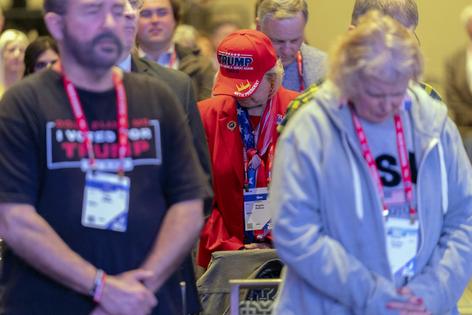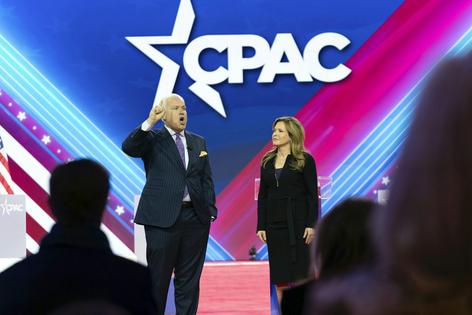I went to CPAC as an anthropologist to understand Trump’s base − they believe, more than ever, he is a savior
Published in Political News
What is happening in the hearts of former President Donald Trump’s supporters?
As an anthropologist who studies peace and conflict, I went to the annual meeting of the Conservative Political Action Conference, or CPAC, to find out. I wanted to better understand the Make America Great Again faithful – and their die-hard support for Trump.
The event began on Feb. 21, 2024, in National Harbor, Maryland, with Steve Bannon’s routine, untrue banter about how President Joe Biden stole the 2020 election, and it peaked with an angry speech from Trump three days later. In between, I sat among the MAGA masses listening to speaker after speaker express outrage about American decline – and their hope for Trump’s reelection.
Everywhere I turned, people wore MAGA regalia – hats, pins, logos and patches, many with Trump’s likeness. I spent breaks in the exhibition hall, which featured a Jan. 6 insurrection-themed pinball machine featuring “Stop the Steal,” “Political Prisoners” and “Babbitt Murder” rally modes and a bus emblazoned with Trump’s face. Admirers scribbled messages on the bus such as, “We have your back” and “You are anointed and appointed by God to be the President.”
Those on the left who dismiss the CPAC as a gathering of MAGA crazies and racists who support a wannabe dictator do not understand that, from this far-right perspective, there are compelling and even urgent reasons to support Trump. Indeed, they believe, as conservative politician Tulsi Gabbard stated in her CPAC speech on Feb. 22, that the left’s claims about Trump’s authoritarianism are “laughable.” This is because CPAC attendees falsely perceive President Joe Biden as the one who is attacking democracy.
Here are my top three takeaways from CPAC about Trump supporters’ current priorities and thinking.
Former President Ronald Reagan runs in CPAC’s DNA. Reagan spoke at the inaugural CPAC in 1974 and went on to speak there a dozen more times.
In 2019, the conservative advocacy group the American Political Union, which hosts CPAC, published a book of Reagan’s speeches with commentary by conservative luminaries. In the preface, Matt Schlapp, the head of the American Political Union, says he often asks himself, “What would Reagan do?”
CPAC’s pomp gala, held Friday, is still called the “Ronald Reagan Dinner.” But Reagan is otherwise hardly mentioned at the conference.
Reagan’s ideas of American exceptionalism have been supplanted by Trump’s populist story of apocalyptic decline. Reagan’s folksy tone, relative moderation and clear quips are long gone, replaced by fury, grievance and mean-spirited barbs.
Many commentators and critics, including groups like the Southern Poverty Law Center, view CPAC as a frightening or bizarre gathering of white nationalists who have a nativist agenda.
In 2021, commentators said the CPAC stage was shaped like a famous Nazi design called the Othala Rune, which is a hate symbol. Schlapp denied this claim and said that CPAC supports the Jewish community, but various commentators took note of the uncanny resemblance.
This year, CPAC refused to give press credentials to various media outlets, including The Washington Post, despite the organization’s emphasis on free speech.
Some speakers, including Trump, have been known to regularly voice support for white nationalism and right-wing extremism, including speakers who promote the false idea that there is a plot to replace the white population. I discuss this idea in my 2021 book, “It Can Happen Here: White Power and the Rising Threat of Genocide in the US.”
Indeed, the U.S.-Mexico border was a constant topic at this year’s CPAC, which included controversial anti-immigrant speakers such as the head of Spain’s far-right Vox party and a representative of Hungary, whose leader stated at the 2022 CPAC that Europeans should not become “mixed-race.” Hungary will also host a CPAC meeting in April 2024.
Many of the sessions have alarming titles like, “Burning Down the House,” “Does Government Even Matter” and “Going Full Hungarian.” There are right-wing, populist speakers like Bannon and U.S. Rep. Matt Gaetz.
Overall, the program is informed by a conservative logic that largely boils down to God, family, tradition, law and order, defense and freedom.
Of these, God looms largest. As a result, CPAC’s hardcore conservative Christian orientation is anti-abortion rights, homophobic and oriented toward traditional family structure and what it considers morality.
Schlapp co-wrote a book in 2022 that warns of the dangers of “evil forces” – what he considers to be progressives, the radical left and American Marxists. Schlapp’s book title even dubs these forces “the desecrators.” Such inflammatory language is frequently used at CPAC, including by Trump during his Saturday speech.
CPAC’s love of Trump is shocking to many on the left. But at CPAC, Trump is viewed as America’s savior.
According to his base, Trump delivered on abortion by appointing Supreme Court justices who overturned Roe v. Wade. They believe that, despite evidence of mixed results, Trump had wide successes at securing the border and creating jobs. For example, during Trump’s time as president, the U.S. economy lost nearly 3 million jobs, and apprehensions of undocumented migrants at the border rose.
Trump’s CPAC speech, like his campaign speeches, harped on such supposed achievements – as well as Biden’s alleged “destruction” of the country.
Conservatives roll their eyes at liberal fears of Trump the despot. Like all of us, they acknowledge, Trump has flaws. They say that some of his comments about women and minorities are cringeworthy, but not evidence of an underlying misogyny and hatefulness, as many critics contend.
Ultimately, CPAC conservatives believe Trump is their best bet to defeat the radical-left “desecrators” who seek to thwart him at every turn – including, as they constantly complained at CPAC, social media bans, “fake news” takedowns, rigged voting, bogus lawsuits, unfair justice, and lies about what they call the Jan. 6, 2021, “protest”.
Despite these hurdles, Trump battles on toward the Republican nomination for presidential candidate – the hero who CPAC conservatives view as the last and best hope to save the USA.
This article is republished from The Conversation, a nonprofit, independent news organization bringing you facts and analysis to help you make sense of our complex world.
Read more:
I went to CPAC to take MAGA supporters’ pulse – China and transgender people are among the top ‘demons’ they say are ruining the country
How a divided America, including the 15% who are ‘MAGA Republicans,’ splits on QAnon, racism and armed patrols at polling places
Alexander Hinton receives funding from the Rutgers-Newark Center for Race and Politics in America.































































Comments